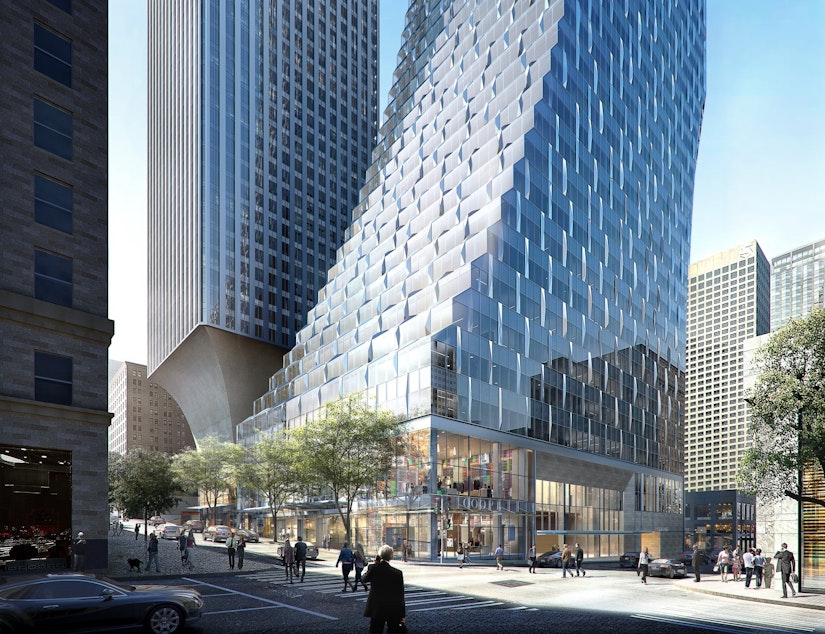Remember Amazon's head tax 'threat'? Now it's pulling out of the Rainier Square tower anyway

Amazon has confirmed that it's pulling out of new tower at Rainier Square. Instead of renting all the office space, the company will sublease it to other tenants.
In Seattle, this may come as a shock. Because last spring, Amazon was criticized for using its lease on the Rainier Square tower, the second tallest skyscraper in Seattle, as a bargaining chip in its fight against Seattle's "head tax."
At the time, Amazon vice president Drew Herdener said that a decision to sublease the space was being evaluated "pending the outcome" of a vote by the City Council to levy new tax on big businesses like Amazon to fund housing and homelessness services. (That was the head tax.)
Herdener's statement, which also said the company was stopping construction on another project, was widely reported as a threat.
And, after a wave of criticism from Amazon and others, Seattle's city council repealed the same tax they had passed less than a month before.
Now, Amazon says it will sublease the tower anyway.
A
s recently as this month, when a Seattle Times headline reported that Amazon was capping its growth in Seattle, Amazon rushed to correct the headline.
A company spokesman assured KUOW that Amazon would not reevaluate its growth plans in Seattle until after it had filled 9,000 vacant positions, filled three South Lake union buildings and filled the Rainier Square tower with even more Amazon employees.
But even though the company offered these reassurances to KUOW earlier this month, it may have had other plans. Geekwire reporter Monica Nickelsburg obtained a flier advertising the space and the sublease went live this weekend. Geekwire also reported that rumors of the sublease had been circulating for weeks prior.
In a statement, the company defended its decision to sublease the space by pointing out other areas of growth in Seattle: the two million square feet of office space the company is building in South Lake Union and the Amazon 9,000 job openings listed in Seattle now.
"We are currently building two million square feet of office space in our South Lake Union campus in Seattle," an Amazon spokesperson said in a statement. "We are always evaluating our space requirements and intend to sublease Rainer Square based on current plans. We have more than 9,000 open roles in Seattle and will continue to evaluate future growth."
According to Business Insider, Amazon currently occupies 20 percent of prime office space in Seattle's downtown core.
Teresa Mosqueda was one of the only two city councilmembers who voted against repealing the head tax. She also traveled to New York to warn leaders there what to expect from the company.
Today, Mosqueda cautioned not to read too much into Amazon's apparent U-turn on Rainier Square.
"What I see is a company that has thrived in Seattle largely due to our infrastructure and our workforce," she said.
Sponsored
Mosqueda said when the city council repealed the head tax, Amazon's threat to stop construction loomed larger than its threat to sublease Rainier Square tower.
But the core problems the head tax was meant to resolve remain, she said.
"We still have a crisis of unmet housing needs, transit needs and infrastructure needs that are going to persist whether it's Amazon at that tower, or Google or Facebook or Apple or who have you," Mosqueda told KUOW. "We have got to all come together and recognize that we need dollars for investment in transit and infrastructure and housing."
Amazon's departure from the Rainier Square tower won’t hurt Seattle’s commercial real estate market, according to Greg Johnson. He's the president of Wright Runstad, which is developing the building. “It’s a significant amount of space, but Seattle’s a pretty large market," he said. "And so on a percentage basis, it’s not going to cause a glut or anything like that, and there's pretty high demand. So the likelihood is it’ll probably be filled up pretty quickly.”
The building is currently under construction and is scheduled for completion in the fall of 2020.
Correction: An earlier version of this story misstated Wright Runstad's relationship to the building. It is the developer, not the owner.




